John Greenleaf Whittier Poems
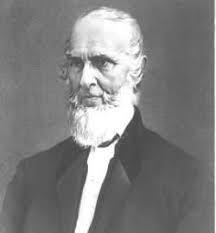
| John
Greenleaf Whittier December 17, 1807-September 7, 1892 American poet |
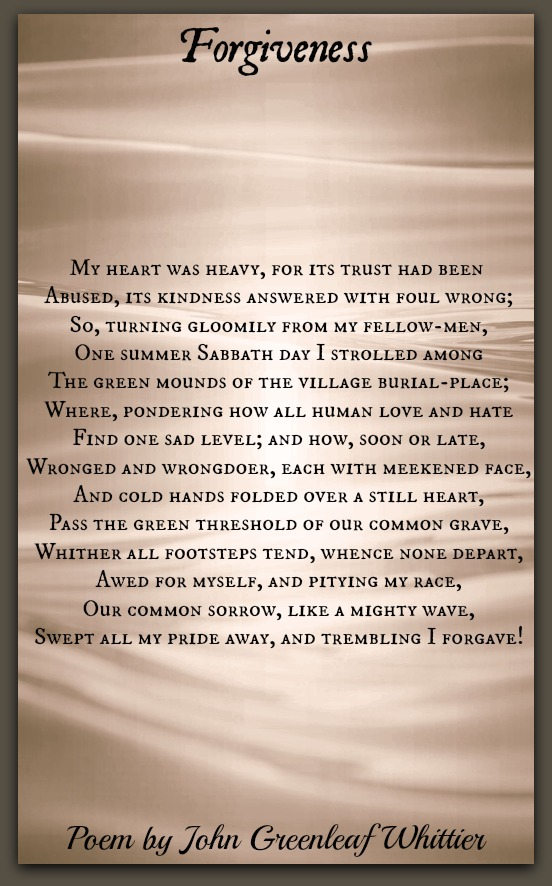 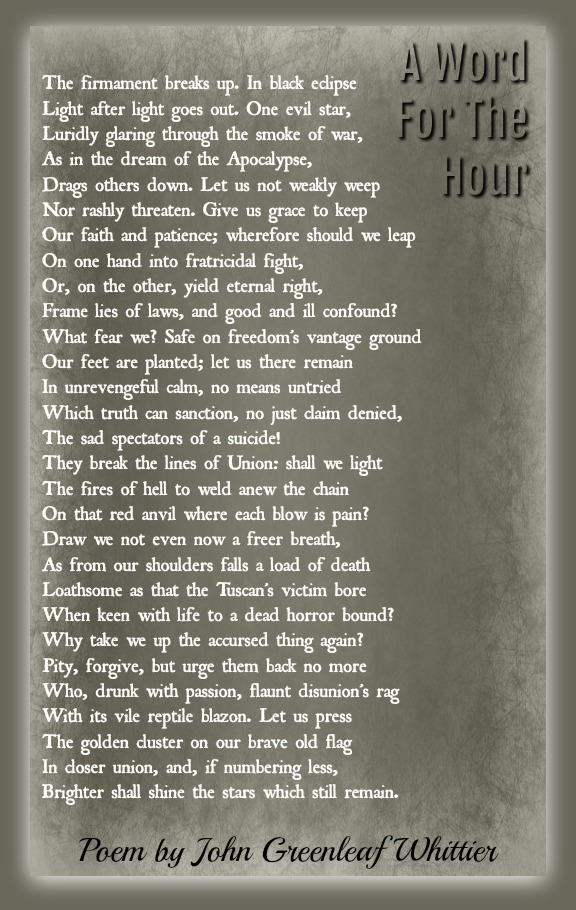 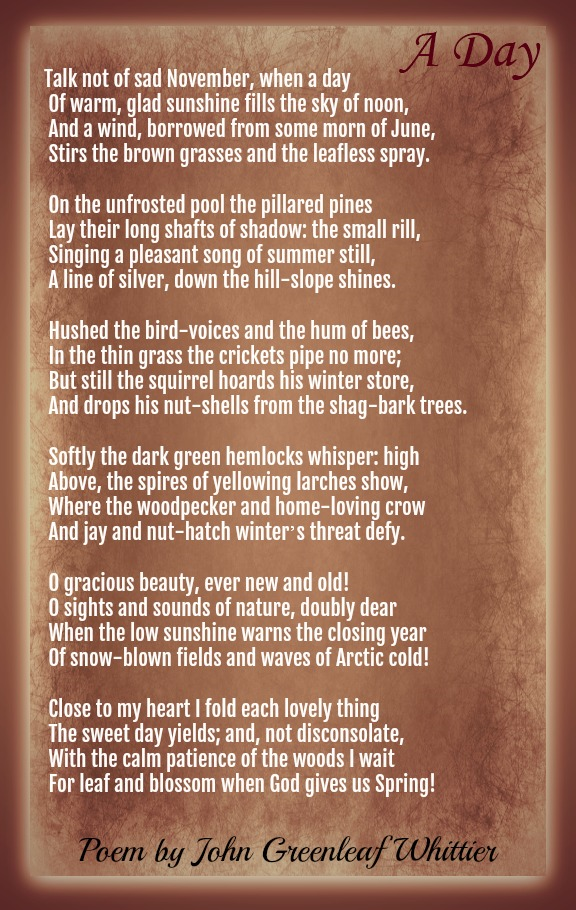 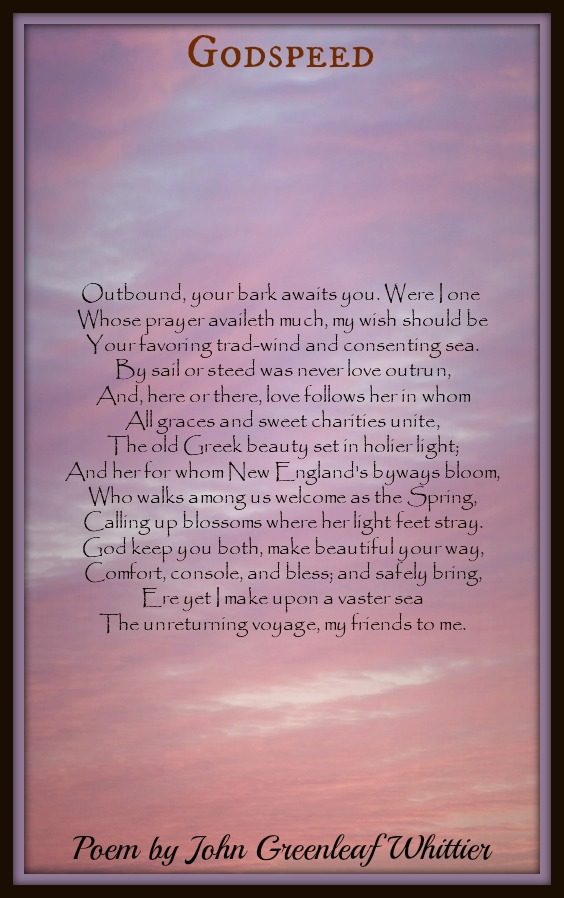 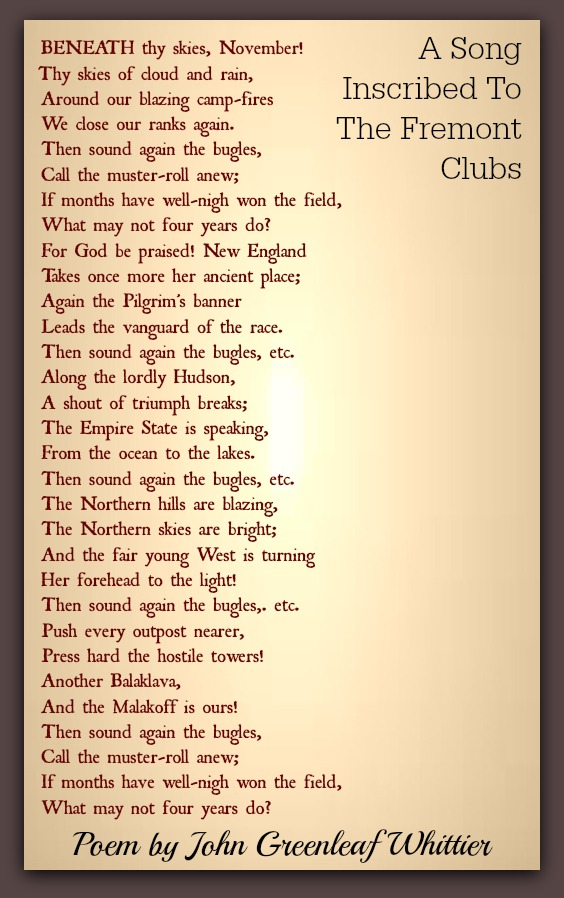 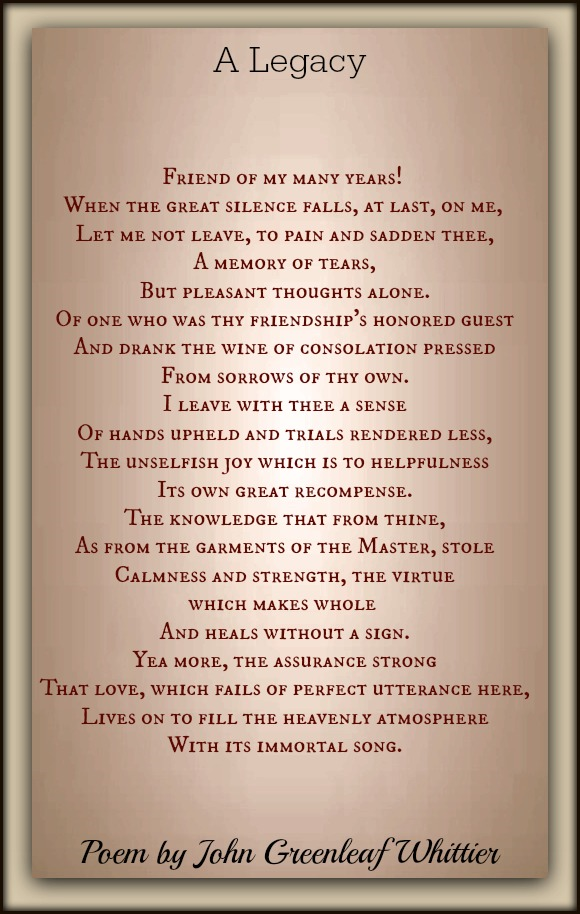 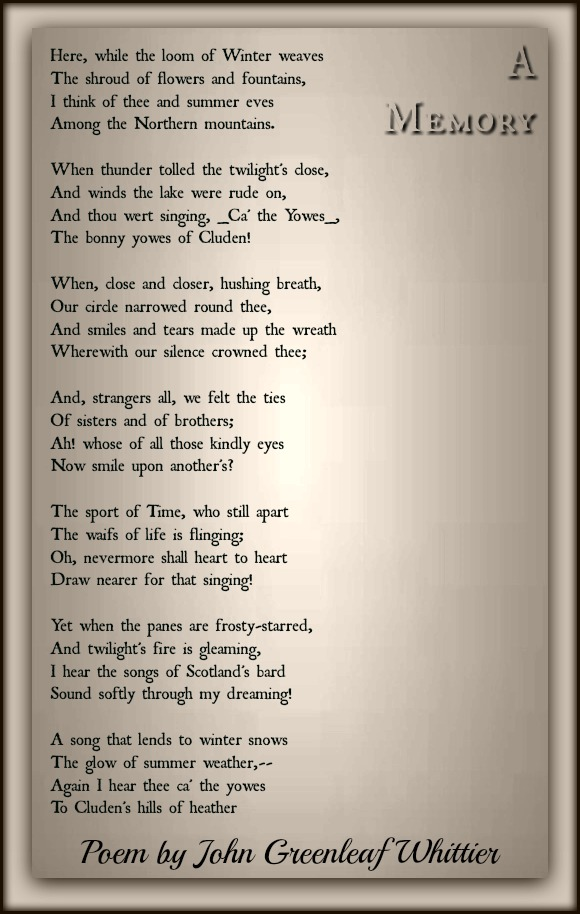 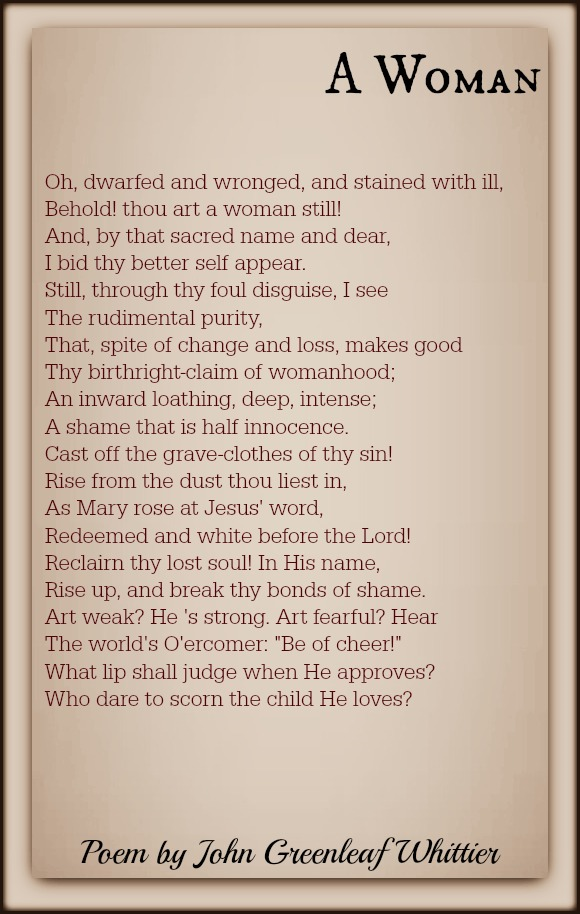 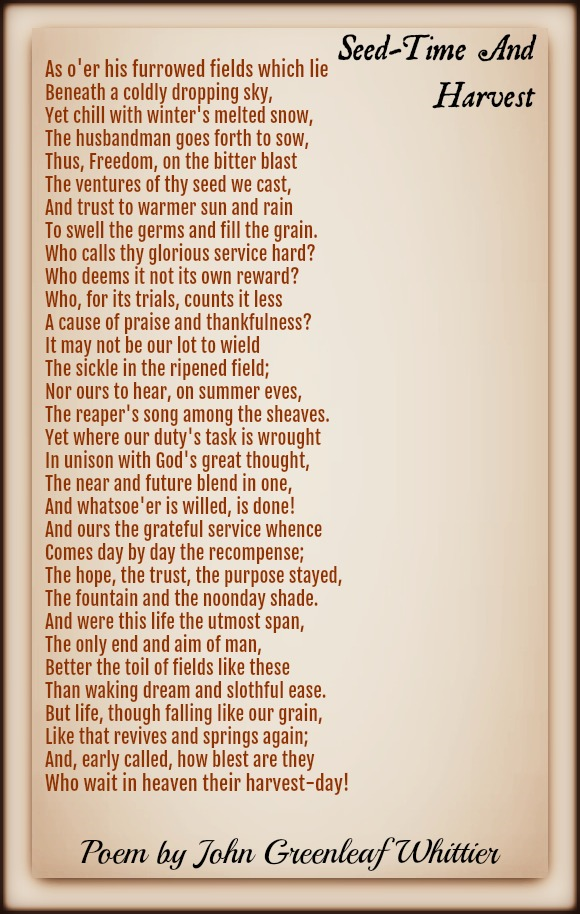 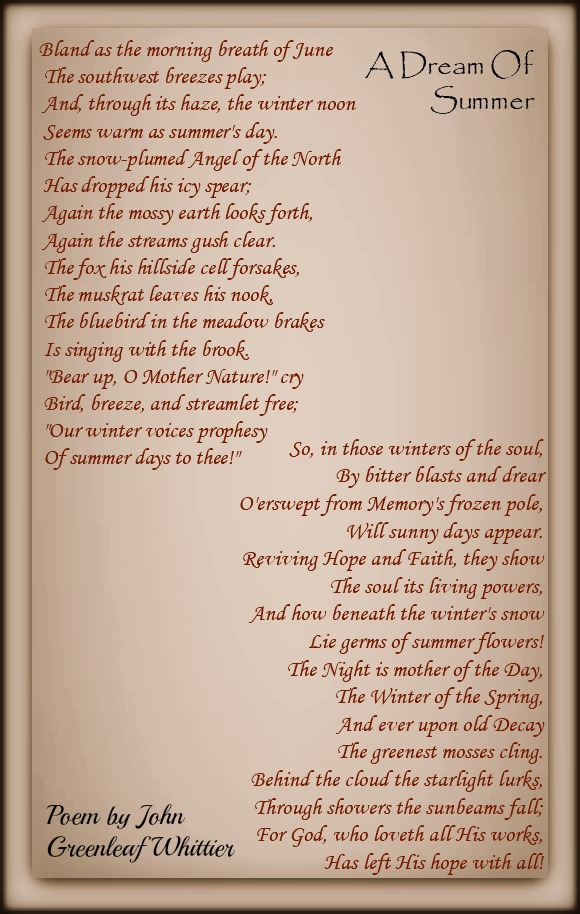 A Sabbath Scene SCARCE had the solemn Sabbath-bell Ceased quivering in the steeple, Scarce had the parson to his desk Walked stately through his people, When down the summer-shaded street A wasted female figure, With dusky brow and naked feet, Came rushing wild and eager. She saw the white spire through the trees, She heard the sweet hymn swelling: O pitying Christ! a refuge give The poor one in Thy dwelling! Like a scared fawn before the hounds, Right up the aisle she glided, While close behind her, whip in hand, A lank-haired hunter strided. She raised a keen and bitter cry, To Heaven. and Earth appealing; Were manhood's generous pulses dead? Had woman's heart no feeling? A score of stout hands rose between The hunter and the flying: Age clenched his staff, and maiden eyes Flashed tearful, yet defying. "Who dares profane this house and day?" Cried out the angry pastor. "Why, bless your soul, the wench's a slave, And I'm her lord and master! "I've law and gospel on my side, And who shall dare refuse me?" Down came the parson, bowing low, "My good sir, pray excuse me! "Of course I know your right divine To own and work and whip her; Quick, deacon, throw that Polyglott Before the wench, and trip her!" Plump dropped the holy tome, and o'er Its sacred pages stumbling, Bound hand and foot, a slave once more, The hapless wretch lay trembling. I saw the parson tie the knots, The while his flock addressing, The Scriptural claims of slavery With text on text impressing. "Although," said he, "on Sabbath day All secular occupations Are deadly sins, we must fulfil Our moral obligations: "And this commends itself as one To every conscience tender; As Paul sent back Onesimus, My Christian friends, we send her!" Shriek rose on shriek, — the Sabbath air Her wild cries tore asunder; I listened, with hushed breath, to hear God answering with his thunder! All still! the very altar's cloth Had smothered down her shrieking, And, dumb, she turned from face to face, For human pity seeking! I saw her dragged along the aisle, Her shackles harshly clanking; I heard the parson, over all, The Lord devoutly thanking! My brain took fire: "Is this," I cried, "The end of prayer and preaching? Then down with pulpit, down with priest, And give us Nature's teaching! "Foul shame and scorn be on ye all Who turn the good to evil, And steal the Bible from the Lord, To give it to the Devil! "Than garbled text or parchment law I own a statute higher; And God is true, though every book And every man's a liar!" Just then I felt the deacon's hand In wrath my coat-tail seize on; I heard the priest cry, "Infidel!" The lawyer mutter, "Treason!" I started up, — where now were church, Slave, master, priest, and people? I only heard the supper-bell, Instead of clanging steeple. But, on the open window's sill, O'er which the white blooms drifted, The pages of a good old Book The wind of summer lifted, And flower and vine, like angel wings Around the Holy Mother, Waved softly there, as if God's truth And Mercy kissed each other. And freely from the cherry-bough Above the casement swinging, With golden bosom to the sun, The oriole was singing. As bird and flower made plain of old The lesson of the Teacher, So now I heard the written Word Interpreted by Nature! For to my ear methought the breeze Bore Freedom's blessed word on; Thus saith the Lord: Break every yoke, Undo the heavy burden! Immortal love, forever full Immortal love, forever full, Forever flowing free, Forever shared, forever whole, A never ebbing sea! Our outward lips confess the name All other names above; Love only knoweth whence it came, And comprehendeth love. Blow, winds of God, awake and blow The mists of earth away: Shine out, O Light divine, and show How wide and far we stray. We may not climb the heavenly steeps To bring the Lord Christ down; In vain we search the lowest deeps, For Him no depths can drown. But warm, sweet, tender, even yet, A present help is He; And faith still has its Olivet, And love its Galilee. The healing of His seamless dress Is by our beds of pain; We touch Him in life’s throng and press, And we are whole again. Through Him the first fond prayers are said Our lips of childhood frame, The last low whispers of our dead Are burdened with His Name. O Lord and Master of us all, Whate’er our name or sign, We own Thy sway, we hear Thy call, We test our lives by Thine. The letter fails, the systems fall, And every symbol wanes; The Spirit over brooding all, Eternal Love remains. Telling the Bees Here is the place; right over the hill Runs the path I took; You can see the gap in the old wall still, And the stepping-stones in the shallow brook. There is the house, with the gate red-barred, And the poplars tall; And the barn's brown length, and the cattle-yard, And the white horns tossing above the wall. There are the beehives ranged in the sun; And down by the brink Of the brook are her poor flowers, weed-o'errun, Pansy and daffodil, rose and pink. A year has gone, as the tortoise goes, Heavy and slow; And the same rose blows, and the same sun glows, And the same brook sings of a year ago. There 's the same sweet clover-smell in the breeze; And the June sun warm Tangles his wings of fire in the trees, Setting, as then, over Fernside farm. I mind me how with a lover's care From my Sunday coat I brushed off the burrs, and smoothed my hair, And cooled at the brookside my brow and throat. Since we parted, a month had passed, — To love, a year; Down through the beeches I looked at last On the little red gate and the well-sweep near. I can see it all now, — the slantwise rain Of light through the leaves, The sundown's blaze on her window-pane, The bloom of her roses under the eaves. Just the same as a month before, — The house and the trees, The barn's brown gable, the vine by the door, — Nothing changed but the hives of bees. Before them, under the garden wall, Forward and back, Went drearily singing the chore-girl small, Draping each hive with a shred of black. Trembling, I listened: the summer sun Had the chill of snow; For I knew she was telling the bees of one Gone on the journey we all must go! Then I said to myself, "My Mary weeps For the dead to-day: Haply her blind old grandsire sleeps The fret and the pain of his age away." But her dog whined low; on the doorway sill, With his cane to his chin, The old man sat; and the chore-girl still Sung to the bees stealing out and in. And the song she was singing ever since In my ear sounds on: — "Stay at home, pretty bees, fly not hence! Mistress Mary is dead and gone!" Maud Muller Maud Muller on a summer's day Raked the meadow sweet with hay. Beneath her torn hat glowed the wealth Of simple beauty and rustic health. Singing, she wrought, and her merry glee The mock-bird echoed from his tree. But when she glanced to the far-off town White from its hill-slope looking down, The sweet song died, and a vague unrest And a nameless longing filled her breast,- A wish that she hardly dared to own, For something better than she had known. The Judge rode slowly down the lane, Smoothing his horse's chestnut mane. He drew his bridle in the shade Of the apple-trees, to greet the maid, And asked a draught from the spring that flowed Through the meadow across the road. She stooped where the cool spring bubbled up, And filled for him her small tin cup, And blushed as she gave it, looking down On her feet so bare, and her tattered gown. "Thanks!" said the Judge; "a sweeter draught From a fairer hand was never quaffed." He spoke of the grass and flowers and trees, Of the singing birds and the humming bees; Then talked of the haying, and wondered whether The cloud in the west would bring foul weather. And Maud forgot her brier-torn gown And her graceful ankles bare and brown; And listened, while a pleased surprise Looked from her long-lashed hazel eyes. At last, like one who for delay Seeks a vain excuse, he rode away. Maud Muller looked and sighed: "Ah me! That I the Judge's bride might be! "He would dress me up in silks so fine, And praise and toast me at his wine. "My father should wear a broadcloth coat; My brother should sail a pointed boat. "I'd dress my mother so grand and gay, And the baby should have a new toy each day. "And I'd feed the hungry and clothe the poor, And all should bless me who left our door." The Judge looked back as he climbed the hill, And saw Maud Muller standing still. "A form more fair, a face more sweet, Ne'er hath it been my lot to meet. "And her modest answer and graceful air Show her wise and good as she is fair. "Would she were mine, and I to-day, Like her, a harvester of hay. "No doubtful balance of rights and wrongs, Nor weary lawyers with endless tongues, "But low of cattle and song of birds, And health and quiet and loving words." But he thought of his sisters, proud and cold, And his mother, vain of her rank and gold. So, closing his heart, the Judge rode on, And Maud was left in the field alone. But the lawyers smiled that afternoon, When he hummed in court an old love-tune; And the young girl mused beside the well Till the rain on the unraked clover fell. He wedded a wife of richest dower, Who lived for fashion, as he for power. Yet oft, in his marble hearth's bright glow, He watched a picture come and go; And sweet Maud Muller's hazel eyes Looked out in their innocent surprise. Oft, when the wine in his glass was red, He longed for the wayside well instead; And closed his eyes on his garnished rooms To dream of meadows and clover-blooms. And the proud man sighed, and with a secret pain, "Ah, that I were free again! "Free as when I rode that day, Where the barefoot maiden raked her hay." She wedded a man unlearned and poor, And many children played round her door. But care and sorrow, and childbirth pain, Left their traces on heart and brain. And oft, when the summer sun shone hot On the new-mown hay in the meadow lot, And she heard the little spring brook fall Over the roadside, through a wall, In the shade of the apple-tree again She saw a rider draw his rein; And, gazing down with timid grace, She felt his pleased eyes read her face. Sometimes her narrow kitchen walls Stretched away into stately halls; The weary wheel to a spinet turned, The tallow candle an astral burned, And for him who sat by the chimney lug, Dozing and grumbling o'er pipe and mug, A manly form at her side she saw, And joy was duty and love was law. Then she took up her burden of life again, Saying only, "It might have been." Alas for the maiden, alas for the Judge, For rich repiner and househole drudge! God pity them both and pity us all, Who vainly the dreams of youth recall. For of all sad words of tongue or pen, The saddest are these: "It might have been!" Ah, well! for us all some sweet hope lies Deeply buried from human eyes; And, in the hereafter, angels may Roll the stone from its grave away! The Yankee Girl She sings by her wheel at that low cottage door, Which the long evening shadow is stretching before; With a music as sweet as the music which seems Breathed softly and faintly in the ear of our dreams! How brilliant and mirthful the light of her eye, Like a star glancing out from the blue of the sky! And lightly and freely her dark tresses play O'er a brow and a bosom as lovely as they! Who comes in his pride to that low cottage door— The haughty and rich to the humble and poor? 'Tis the great Southern planter—the master who waves His whip of dominion o'er hundreds of slaves. "Nay, Ellen, for shame! Let those Yankee fools spin, Who would pass for our slaves with a change of their skin; Let them toil as they will at the loom or the wheel Too stupid for shame and too vulgar to feel! "But thou art too lovely and precious a gem To be bound to their burdens and sullied by them— For shame, Ellen, shame!—cast thy bondage aside, And away to the South, as my blessing and pride. "O, come where no winter thy footsteps can wrong, But where flowers are blossoming all the year long, Where the shade of the palm-tree is over my home, And the lemon and orange are white in their bloom! "O, come to my home, where my servants shall all Depart at thy bidding and come at thy call; They shall heed thee as mistress with trembling and awe, And each wish of thy heart shall be felt as a law." O, could ye have seen her—that pride of our girls— Arise and cast back the dark wealth of her curls, With a scorn in her eye which the gazer could feel, And a glance like the sunshine that flashes on steel: "Go back, haughty Southron! thy treasures of gold Are dim with the blood of the hearts thou hast sold! Thy home may be lovely, but round it I hear The crack of the whip and the footsteps of fear! "And the sky of thy South may be brighter than ours, And greener thy landscapes, and fairer thy flowers; But, dearer the blast round our mountains which raves, Than the sweet sunny zephyr which breathes over slaves! "Full low at thy bidding thy negroes may kneel, With the iron of bondage on spirit and heel; Yet know that the Yankee girl sooner would be In fetters with them, than in freedom with thee!" Burning Drift-Wood Before my drift-wood fire I sit, And see, with every waif I burn, Old dreams and fancies coloring it, And folly's unlaid ghosts return. O ships of mine, whose swift keels cleft The enchanted sea on which they sailed, Are these poor fragments only left Of vain desires and hopes that failed? Did I not watch from them the light Of sunset on my towers in Spain, And see, far off, uploom in sight The Fortunate Isles I might not gain? Did sudden lift of fog reveal Arcadia's vales of song and spring, And did I pass, with grazing keel, The rocks whereon the sirens sing? Have I not drifted hard upon The unmapped regions lost to man, The cloud-pitched tents of Prester John, The palace domes of Kubla Khan? Did land winds blow from jasmine flowers, Where Youth the ageless Fountain fills? Did Love make sign from rose blown bowers, And gold from Eldorado's hills? Alas! the gallant ships, that sailed On blind Adventure's errand sent, Howe'er they laid their courses, failed To reach the haven of Content. And of my ventures, those alone Which Love had freighted, safely sped, Seeking a good beyond my own, By clear-eyed Duty piloted. O mariners, hoping still to meet The luck Arabian voyagers met, And find in Baghdad's moonlit street, Haroun al Raschid walking yet, Take with you, on your Sea of Dreams, The fair, fond fancies dear to youth. I turn from all that only seems, And seek the sober grounds of truth. What matter that it is not May, That birds have flown, and trees are bare, That darker grows the shortening day, And colder blows the wintry air! The wrecks of passion and desire, The castles I no more rebuild, May fitly feed my drift-wood fire, And warm the hands that age has chilled. Whatever perished with my ships, I only know the best remains; A song of praise is on my lips For losses which are now my gains. Heap high my hearth! No worth is lost; No wisdom with the folly dies. Burn on, poor shreds, your holocaust Shall be my evening sacrifice! Far more than all I dared to dream, Unsought before my door I see; On wings of fire and steeds of steam The world's great wonders come to me, And holier signs, unmarked before, Of Love to seek and Power to save, — The righting of the wronged and poor, The man evolving from the slave; And life, no longer chance or fate, Safe in the gracious Fatherhood. I fold o'er-wearied hands and wait, In full assurance of the good. And well the waiting time must be, Though brief or long its granted days, If Faith and Hope and Charity Sit by my evening hearth-fire's blaze. And with them, friends whom Heaven has spared, Whose love my heart has comforted, And, sharing all my joys, has shared My tender memories of the dead, — Dear souls who left us lonely here, Bound on their last, long voyage, to whom We, day by day, are drawing near, Where every bark has sailing room. I know the solemn monotone Of waters calling unto me; I know from whence the airs have blown That whisper of the Eternal Sea. As low my fires of drift-wood burn, I hear that sea's deep sounds increase, And, fair in sunset light, discern Its mirage-lifted Isles of Peace. Burning Drift-Wood Before my drift-wood fire I sit, And see, with every waif I burn, Old dreams and fancies coloring it, And folly's unlaid ghosts return. O ships of mine, whose swift keels cleft The enchanted sea on which they sailed, Are these poor fragments only left Of vain desires and hopes that failed? Did I not watch from them the light Of sunset on my towers in Spain, And see, far off, uploom in sight The Fortunate Isles I might not gain? Did sudden lift of fog reveal Arcadia's vales of song and spring, And did I pass, with grazing keel, The rocks whereon the sirens sing? Have I not drifted hard upon The unmapped regions lost to man, The cloud-pitched tents of Prester John, The palace domes of Kubla Khan? Did land winds blow from jasmine flowers, Where Youth the ageless Fountain fills? Did Love make sign from rose blown bowers, And gold from Eldorado's hills? Alas! the gallant ships, that sailed On blind Adventure's errand sent, Howe'er they laid their courses, failed To reach the haven of Content. And of my ventures, those alone Which Love had freighted, safely sped, Seeking a good beyond my own, By clear-eyed Duty piloted. O mariners, hoping still to meet The luck Arabian voyagers met, And find in Baghdad's moonlit street, Haroun al Raschid walking yet, Take with you, on your Sea of Dreams, The fair, fond fancies dear to youth. I turn from all that only seems, And seek the sober grounds of truth. What matter that it is not May, That birds have flown, and trees are bare, That darker grows the shortening day, And colder blows the wintry air! The wrecks of passion and desire, The castles I no more rebuild, May fitly feed my drift-wood fire, And warm the hands that age has chilled. Whatever perished with my ships, I only know the best remains; A song of praise is on my lips For losses which are now my gains. Heap high my hearth! No worth is lost; No wisdom with the folly dies. Burn on, poor shreds, your holocaust Shall be my evening sacrifice! Far more than all I dared to dream, Unsought before my door I see; On wings of fire and steeds of steam The world's great wonders come to me, And holier signs, unmarked before, Of Love to seek and Power to save, — The righting of the wronged and poor, The man evolving from the slave; And life, no longer chance or fate, Safe in the gracious Fatherhood. I fold o'er-wearied hands and wait, In full assurance of the good. And well the waiting time must be, Though brief or long its granted days, If Faith and Hope and Charity Sit by my evening hearth-fire's blaze. And with them, friends whom Heaven has spared, Whose love my heart has comforted, And, sharing all my joys, has shared My tender memories of the dead, — Dear souls who left us lonely here, Bound on their last, long voyage, to whom We, day by day, are drawing near, Where every bark has sailing room. I know the solemn monotone Of waters calling unto me; I know from whence the airs have blown That whisper of the Eternal Sea. As low my fires of drift-wood burn, I hear that sea's deep sounds increase, And, fair in sunset light, discern Its mirage-lifted Isles of Peace. The Worship of Nature The harp at Nature's advent strung Has never ceased to play; The song the stars of morning sung Has never died away. And prayer is made, and praise is given, By all things near and far; The ocean looketh up to heaven, And mirrors every star. Its waves are kneeling on the strand, As kneels the human knee, Their white locks bowing to the sand, The priesthood of the sea! They pour their glittering treasures forth, Their gifts of pearl they bring, And all the listening hills of earth Take up the song they sing. The green earth sends its incense up From many a mountain shrine; From folded leaf and dewy cup She pours her sacred wine. The mists above the morning rills Rise white as wings of prayer; The altar-curtains of the hills Are sunset's purple air. The winds with hymns of praise are loud, Or low with sobs of pain, — The thunder-organ of the cloud, The dropping tears of rain. With drooping head and branches crossed The twilight forest grieves, Or speaks with tongues of Pentecost From all its sunlit leaves. The blue sky is the temple's arch, Its transept earth and air, The music of its starry march The chorus of a prayer. So Nature keeps the reverent frame With which her years began, And all her signs and voices shame The prayerless heart of man. A Word for the Hour The firmament breaks up. In black eclipse Light after light goes out. One evil star, Luridly glaring through the smoke of war, As in the dream of the Apocalypse, Drags others down. Let us not weakly weep Nor rashly threaten. Give us grace to keep Our faith and patience; wherefore should we leap On one hand into fratricidal fight, Or, on the other, yield eternal right, Frame lies of laws, and good and ill confound? What fear we? Safe on freedom's vantage ground Our feet are planted; let us there remain In unrevengeful calm, no means untried Which truth can sanction, no just claim denied, The sad spectators of a suicide! They break the lines of Union: shall we light The fires of hell to weld anew the chain On that red anvil where each blow is pain? Draw we not even now a freer breath, As from our shoulders falls a load of death Loathsome as that the Tuscan's victim bore When keen with life to a dead horror bound? Why take we up the accursed thing again? Pity, forgive, but urge them back no more Who, drunk with passion, flaunt disunion's rag With its vile reptile blazon. Let us press The golden cluster on our brave old flag In closer union, and, if numbering less, Brighter shall shine the stars which still remain. The Eternal Goodness O Friends! with whom my feet have trod The quiet aisles of prayer, Glad witness to your zeal for God And love of man I bear. I trace your lines of argument; Your logic linked and strong I weigh as one who dreads dissent, And fears a doubt as wrong. But still my human hands are weak To hold your iron creeds: Against the words ye bid me speak My heart within me pleads. Who fathoms the Eternal Thought? Who talks of scheme and plan? The Lord is God! He needeth not The poor device of man. I walk with bare, hushed feet the ground Ye tread with boldness shod; I dare not fix with mete and bound The love and power of God. Ye praise His justice; even such His pitying love I deem: Ye seek a king; I fain would touch The robe that hath no seam. Ye see the curse which overbroods A world of pain and loss; I hear our Lord's beatitudes And prayer upon the cross. More than your schoolmen teach, within Myself, alas! I know: Too dark ye cannot paint the sin, Too small the merit show. I bow my forehead to the dust, I veil mine eyes for shame, And urge, in trembling self-distrust, A prayer without a claim. I see the wrong that round me lies, I feel the guilt within; I hear, with groan and travail-cries, The world confess its sin. Yet, in the maddening maze of things, And tossed by storm and flood, To one fixed trust my spirit clings; I know that God is good! Not mine to look where cherubim And seraphs may not see, But nothing can be good in Him Which evil is in me. The wrong that pains my soul below I dare not throne above, I know not of His hate, - I know His goodness and His love. I dimly guess from blessings known Of greater out of sight, And, with the chastened Psalmist, own His judgments too are right. I long for household voices gone. For vanished smiles I long, But God hath led my dear ones on, And He can do no wrong. I know not what the future hath Of marvel or surprise, Assured alone that life and death His mercy underlies. And if my heart and flesh are weak To bear an untried pain, The bruised reed He will not break, But strengthen and sustain. No offering of my own I have, Nor works my faith to prove; I can but give the gifts He gave, And plead His love for love. And so beside the Silent Sea I wait the muffled oar; No harm from Him can come to me On ocean or on shore. I know not where His islands lift Their fronded palms in air; I only know I cannot drift Beyond His love and care. O brothers! if my faith is vain, If hopes like these betray, Pray for me that my feet may gain The sure and safer way. And Thou, O Lord! by whom are seen Thy creatures as they be, Forgive me if too close I lean My human heart on Thee! A Day Talk not of sad November, when a day Of warm, glad sunshine fills the sky of noon, And a wind, borrowed from some morn of June, Stirs the brown grasses and the leafless spray. On the unfrosted pool the pillared pines Lay their long shafts of shadow: the small rill, Singing a pleasant song of summer still, A line of silver, down the hill-slope shines. Hushed the bird-voices and the hum of bees, In the thin grass the crickets pipe no more; But still the squirrel hoards his winter store, And drops his nut-shells from the shag-bark trees. Softly the dark green hemlocks whisper: high Above, the spires of yellowing larches show, Where the woodpecker and home-loving crow And jay and nut-hatch winter’s threat defy. O gracious beauty, ever new and old! O sights and sounds of nature, doubly dear When the low sunshine warns the closing year Of snow-blown fields and waves of Arctic cold! Close to my heart I fold each lovely thing The sweet day yields; and, not disconsolate, With the calm patience of the woods I wait For leaf and blossom when God gives us Spring! A Summons MEN of the North-land! where's the manly spirit Of the true-hearted and the unshackled gone? Sons of old freemen, do we but inherit Their names alone? Is the old Pilgrim spirit quenched within us, Stoops the strong manhood of our souls so low, That Mammon's lure or Party's wile can win us To silence now? Now, when our land to ruin's brink is verging, In God's name, let us speak while there is time! Now, when the padlocks for our lips are forging, Silence is crime! What! shall we henceforth humbly ask as favors Rights all our own? In madness shall we barter, For treacherous peace, the freedom Nature gave us, God and our charter? Here shall the statesman forge his human fetters, Here the false jurist human rights deny, And in the church, their proud and skilled abettors. Make truth a lie? Torture the pages of the hallowed Bible, To sanction crime, and robbery, and blood? And, in Oppression's hateful service, libel Both man and God? Shall our New England stand erect no longer, But stoop in chains upon her downward way, Thicker to gather on her limbs and stronger Day after day? Oh no; methinks from all her wild, green mountains; From valleys where her slumbering fathers lie; From her blue rivers and her welling fountains, And clear, cold sky; From her rough coast, and isles, which hungry Ocean Gnaws with his surges; from the fisher's skiff, With white sail swaying to the billows' motion Round rock and cliff; From the free fireside of her unbought farmer; From her free laborer at his loom and wheel; From the brown smith-shop, where, beneath the hammer, Rings the red steel; From each and all, if God hath not forsaken Our land, and left us to an evil choice, Loud as the summer thunderbolt shall waken A People's voice. Startling and stern! the Northern winds shall bear it Over Potomac's to St. Mary's wave; And buried Freedom shall awake to hear it Within her grave. Oh, let that voice go forth! The bondman sighing By Santee's wave, in Mississippi's cane, Shall feel the hope, within his bosom dying, Revive again. Let it go forth! The millions who are gazing Sadly upon us from afar shall smile, And unto God devout thanksgiving raising, Bless us the while. Oh for your ancient freedom, pure and holy, For the deliverance of a groaning earth, For the wronged captive, bleeding, crushed, and lowly, Let it go forth! Sons of the best of fathers! will ye falter With all they left ye perilled and at stake? Ho! once again on Freedom's holy altar The fire awake! Prayer-strengthened for the trial, come together, Put on the harness for the moral fight, And, with the blessing of your Heavenly Father, Maintain the right! At Port Royal The tent-lights glimmer on the land, The ship-lights on the sea; The night-wind smooths with drifting sand Our track on lone Tybee. At last our grating keels outslide, Our good boats forward swing; And while we ride the land-locked tide, Our negroes row and sing. For dear the bondman holds his gifts Of music and of song: The gold that kindly Nature sifts Among his sands of wrong; The power to make his toiling days And poor home-comforts please; The quaint relief of mirth that plays With sorrow's minor keys. Another glow than sunset's fire Has filled the West with light, Where field and garner, barn and byre, Are blazing through the night. The land is wild with fear and hate, The rout runs mad and fast; From hand to hand, from gate to gate, The flaming brand is passed. The lurid glow falls strong across Dark faces broad with smiles; Not theirs the terror, hate, and loss That fire yon blazing piles. With oar-strokes timing to their song, They weave in simple lays The pathos of remembered wrong, The hope of better days,— The triumph-note that Miriam sung, The joy of uncaged birds: Softening with Afric's mellow tongue Their broken Saxon words. A Song For The Time UP, laggards of Freedom! — our free flag is cast To the blaze of the sun and the wings of the blast; Will ye turn from a struggle so bravely begun, From a foe that is breaking, a field that's half won? Whoso loves not his kind, and who fears not the Lord, Let him join that foe's service, accursed and abhorred! Let him do his base will, as the slave only can, — Let him put on the bloodhound, and put off the Man! Let him go where the cold blood that creeps in his veins Shall stiffen the slave-whip, and rust on his chains; Where the black slave shall laugh in his bonds, to behold The White Slave beside him, self-lettered and sold! But ye, who still boast of hearts beating and warm, Rise, from lake shore and ocean's, like waves in a storm, Come, throng round our banner in Liberty's name, Like winds from your mountains, like prairies aflame! Our foe, hidden long in his ambush of night, Now, forced from his covert, stands black in the light. Oh, the cruel to Man, and the hateful to God, Smite him down to the earth, that is cursed where he trod! For deeper than thunder of summer's loud shower, On the dome of the sky God is striking the hour! Shall we falter before what we're prayed for so long, When the Wrong is so weak, and the Right is so strong? Come forth all together! come old and come young, Freedom's vote in each hand, and her song on each tongue; Truth naked is stronger than Falsehood in mail; The Wrong cannot prosper, the Right cannot fail! Like leaves of the summer once numbered the foe, But the hoar-frost is falling, the northern winds blow; Like leaves of November erelong shall they fall, For earth wearies of them, and God's over all! Laus Deo It is done! Clang of bell and roar of gun Send the tidings up and down. How the belfries rock and reel! How the great guns, peal on peal, Fling the joy from town to town! Ring, O bells! Every stroke exulting tells Of the burial hour of crime. Loud and long, that all may hear, Ring for every listening ear Of Eternity and Time! Let us kneel: God's own voice is in that peal, And this spot is holy ground. Lord, forgive us! What are we That our eyes this glory see, That our ears have heard this sound! For the Lord On the whirlwind is abroad; In the earthquake He has spoken; He has smitten with His thunder The iron walls asunder, And the gates of brass are broken! Loud and long Lift the old exulting song; Sing with Miriam by the sea, He has cast the mighty down; Horse and rider sink and drown; 'He hath triumphed gloriously!' Did we dare, In our agony of prayer, Ask for more than He has done? When was ever His right hand Over any time or land Stretched as now beneath the sun? How they pale, Ancient myth and song and tale, In this wonder of our days When the cruel rod of war Blossoms white with righteous law, And the wrath of man is praise! Blotted out! All within and all about Shall a fresher life begin; Freer breathe the universe As it rolls its heavy curse On the dead and buried sin! It is done! In the circuit of the sun Shall the sound thereof go forth. It shall bid the sad rejoice, It shall give the dumb a voice, It shall belt with joy the earth! Ring and swing, Bells of joy! On morning's wing Sound the song of praise abroad! With a sound of broken chains Tell the nations that He reigns, Who alone is Lord and God! |
Return To Famous Poets
John Greenleaf Whittier Poems
